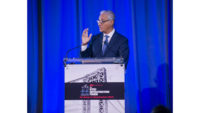
Port Authority of New York and New Jersey officials, stung by an audit detailing cost overruns at the World Trade Center, say they are pursuing increased private investment to recoup some of the burgeoning costs of rebuilding at Ground Zero. But a concentrated "top-bottom" review of the agency will come after June 31, when the second phase of the report is released.
The Jan. 31 interim report, commissioned by the governors of N.Y. and N.J. and submitted by Navigant Consulting Inc., noted that the cost of rebuilding at Ground Zero has risen by $4 billion, to almost $15 billion since its $11 billion estimate in 2008.
"The Port Authority has expanded beyond its stated mission as a transportation infrastructure organization and ... has also become a major real estate developer and asset owner with investments that dwarf its past holdings," the report stated. It cited the lack of a "clear leader" of the capital program, inconsistent reporting mechanisms and a failure "to effectively address the challenges facing the Port Authority. There is a lack of proper accountability for development, construction and asset management to the executive director." The report calls for a full review of organizational design of capital planning.
Phase two will include: "a comprehensive forensic construction cost audit of the entire WTC program" and potential mitigation strategies, a status evaluation of current construction claims and recommendations for standardized construction cost reporting. It will also suggest possible funding sources for the agency's transportation needs.
In the meantime "it's not that nothing will happen, but nothing concrete yet has been decided," says agency spokesman Steve Coleman. Employee suggestions could be taken to the board for approval at its next meeting in late March.
In their letter to the governors, the Port Authority leaders wrote: "Already, our executive management team is focusing on various steps ... including streamlining preconstruction approval processes; reducing 'soft costs' associated with project development; requiring financial department review of all transactions before they are brought to the board; and improving communications internally to foster better collaboration and decisionmaking for critical projects."
For now, critics appear to be in wait-and-see mode. "Everybody seems keyed in that the Port Authority is dysfunctional, but there is no surprise in that," says Robert Sinclair, a spokesman for the American Automobile Association, which filed suit against the Port Authority in September charging the agency with using toll revenue to pay for non-transportation projects, including the World Trade Center.




